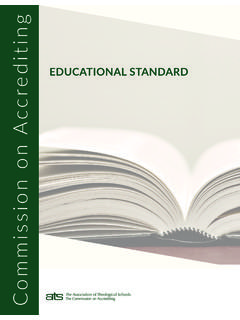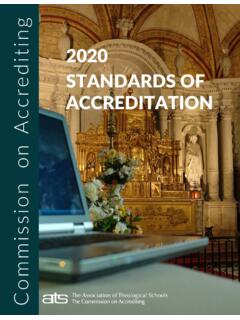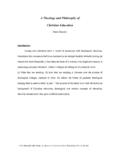Transcription of Commission on Accrediting - The Association of Theological ...
1 Commission on AccreditingDEGREE PROGRAM STANDARDSTABLE OF CONTENTSS tandard A Master of Divinity (MDiv) 1 Standard B Master of Arts in [specialized ministry] (MA in [specialized ministry]), or Master of [specialized ministry] (MRE, MCE, MPS, etc ) 7 Standard C Master of Church Music (MCM) 13 Master of Sacred Music (MSM) Master of Music in Church Music (MM in Church Music) Master of Arts in Church Music (MA in Church Music)Standard D Master of Arts (MA) 17 Master of Arts [academic discipline] Master of Theological Studies (MTS)Standard E Doctor of Ministry (DMin) 20 Standard F Doctor of Education (EdD)
2 26 Standard G Doctor of [area of specialization] including the DEdMin and DMiss 29 Standard H Doctor of Musical Arts (DMA) 37 Doctor of Church Music (DCM) Doctor of Sacred Music (SMD)Standard I Master of Theology (ThM) 41 Master of Sacred Theology (STM)Standard J Doctor of Philosophy (PhD) 44 Doctor of Theology (ThD)DEGREE PROGRAM STANDARDS 1 of 48 Commission ON Accrediting APPROVED 06/2012 | POSTED 01/21/15 Basic Programs Oriented Toward Ministerial LeadershipStandard A Master of Divinity (MDiv)
3 Purpose, goals, learning outcomes, and educational assessmentA 1 1 Purpose of the degree The purpose of the Master of Divinity degree is to prepare persons for ordained ministry and for general pastoral and religious leadership responsibilities in congregations and other settings. Because of its breadth, it is the recommended degree for admission to the Doctor of Ministry degree program and a recommended degree for admission to advanced programs oriented to Theological research and 1 2 Primary goals of the The goals an institution adopts for an MDiv degree should be related to the institution s mission and foster students knowledge of religious heritage, understand-ing of the cultural context, growth in spiritual depth and moral integrity.
4 And capacity for ministerial and public 1 3 Learning The primary goals of the program shall be further delineated as demonstrable learning outcomes congruent with the institution s mission and purpose. Institutions shall demonstrate that students have achieved the goals or learning outcomes of the degree program by means of direct and indirect evidence of student learning. These specific, learning outcomes should shape and inform the design of all courses, supervised ministry experiences, formation activities, and other instructional strategies to establish a coherent and integrated curriculum for the degree Educational The institution offering the MDiv shall articulate the assessment strategy and criteria by which it regularly evaluates the educational effectiveness of the degree program.
5 The institution shall determine the extent to which students have NOTE: This Degree Program Standard assumes member schools also use and follow the Educational Standard (ES), which applies to all degree programs and which addresses such issues as nomenclature ( ), extension education ( ), distance education ( ), and assessment ( ).DEGREE PROGRAM STANDARDS 2 of 48 Commission ON Accrediting APPROVED 06/2012 | POSTED 01/21/15achieved the stated goals of the degree program by the use of both direct and indirect evidence. The institution shall also maintain ongoing assessment by which it determines the extent to which the degree program is meeting the needs of students and the institution s overall goals for the program, including measures such as the percent-age of students who complete the program and the percentage of graduates who find placement appropriate to their vocational 2 Program The MDiv program should provide a breadth of exposure to the Theological disciplines as well as a depth of understanding within those disciplines.
6 It should educate students for a comprehensive range of pastoral responsibilities and skills by providing opportunities for the appropriation of Theological disciplines, for deepening understanding of the life of the church, for ongoing intellectual and ministerial formation, and for exercising the arts of ministry. The learning outcomes for the MDiv shall encompass the instructional areas of religious heritage, cultural context, personal and spiritual formation, and capacity for ministerial and public leadership. Each of the degree requirements shall be further refined as specific, demonstrable learning outcomes that are congruent with the institution s mission and Religious heritage.
7 The program shall provide structured opportunities to develop a comprehensive and discriminating understanding of the religious Instruction shall be provided in Scripture, in the historical development and contemporary articulation of the doctrinal and Theological tradition of the community of faith, and in the social and institutional history of that Attention should be given both to the broader heritage of the Christian tradi-tion as such and to the more specific character of particular Christian traditions and communities, to the ways the traditions transcend particular social and cultural set-tings, and to the ways they come to unique expression in Instruction in these areas shall be conducted so as to indicate their inter-dependence with each other and with other areas of the curriculum as well as their significance for the exercise of pastoral Cultural context.
8 The program shall provide opportunities to develop a critical under-standing of and creative engagement with the cultural realities and structures within which the church lives and carries out its The program shall provide for instruction in contemporary cultural and social issues and their significance for diverse linguistic and cultural contexts of ministry. DEGREE PROGRAM STANDARDS 3 of 48 Commission ON Accrediting APPROVED 06/2012 | POSTED 01/21/15 Such instruction should draw on the insights of the arts and humanities, the natural sciences, and the social MDiv education shall engage students with the global character of the church as well as ministry in the multifaith and multicultural context of contemporary society.
9 This should include attention to the wide diversity of religious traditions present in potential ministry settings, as well as expressions of social justice and respect congru-ent with the institution s mission and Personal and spiritual formation: The program shall provide opportunities through which the student may grow in personal faith, emotional maturity, moral integrity, and public witness. Ministerial preparation includes concern with the development of capacities intel-lectual and affective, individual and corporate, ecclesial and public that are requisite to a life of pastoral leadership.
10 The program shall provide for spiritual, academic, and vocational counseling and careful reflection on ministerial roles such as leader, guide, and servant of the faith The program shall provide opportunities to assist students in developing commitment to Christian faith and life ( , expressions of justice, leadership develop-ment, the devotional life, evangelistic witness) in ways consistent with the overall goal and purpose of the institution s MDiv Capacity for ministerial and public leadership: The program shall provide Theological reflection on and education for the practice of ministry.









